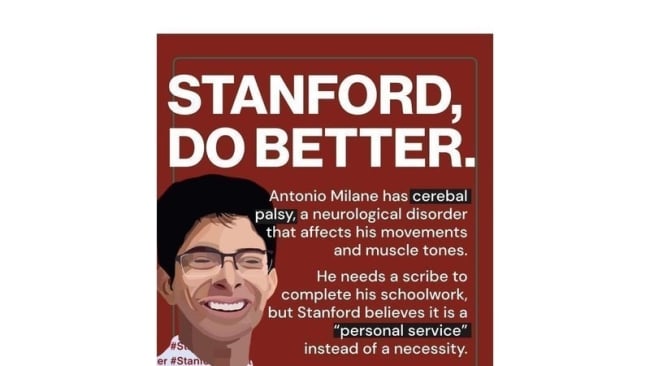You have /5 articles left.
Sign up for a free account or log in.

Change.org
Antonio Milane dreamed of going to Stanford University. Several months ago, his dream came true.
"I was accepted into my dream school, Stanford University. At first, I felt like I was on top of the world," he wrote in a Change.org petition that has attracted 57,000 supporters. But his acceptance was followed by a rejection -- of an accommodation request.
He described his battle with cerebral palsy, which dates back to his birth. His doctors describe him as a "miracle child" who hadn’t been expected to live. He also has epilepsy.
"Just when I thought that the battle was over and that I could delve into my dreams at last, I realized that I might not be able to attend. The same story that befell me in prior years was going to consume my life again: Stanford University is unwilling to provide me access to a scribe for assignments, deeming my necessity as a ‘personal preference.’ Despite being an institution with billions of dollars, with enough resources to easily provide me with the needed accommodations, Stanford still negates its responsibility to do so, thus representing a blockade in my future endeavors. Simply put, I would be unable to attend Stanford and achieve my goals without the assistance of a scribe, as work will be impossible to complete for a boy who can not write," he wrote.
"This petition represents the voice of the silenced and the continuous fight for accessibility. Around the country, thousands of disabled students fight for the right to attend college. My story coincides with this battle, and it is before you now," he added.
What Stanford said at the time was that it would provide a scribe for class time, but not beyond that. Having a scribe to help with homework was a "personal service" for which the university would not pay.
Now, the university is responding differently.
"Our goal is always to ensure that all of our students can take advantage of every academic opportunity the university offers and enjoy a meaningful student experience," Dee Mostofi, assistant vice president for media relations and communications, said in an email. "The Office of Accessible Education generally conducts the initial assessment process after students accept and enroll with us to determine what they need to be successful at Stanford. In this case, should Mr. Milane choose to come to Stanford to pursue his undergraduate education, we are committing to supporting his request for an academic scribe or typists to assist him with his out-of-classroom coursework needs."
She added, "The increased dialogue of the past few days about accessibility has underscored the importance of looking at the totality of our disability programs and re-envisioning what the next era of disability access at Stanford should encompass. Work will begin this spring with a study group, which will research and analyze best practices for disability access at academic institutions. These efforts will inform a new task force that will launch in the fall. As we evolve to meet the needs of our student community, we must ensure that our programs are consistent with our values as an inclusive university."
Previous statements from Stanford over the past week did not name Milane or speak of any commitments to him, or of reviewing the university’s policies.
"As we said in our statement, we always work with our students to make sure they have what they need to be successful at Stanford," Mostofi said. "In cases like Mr. Milane’s, this would happen through the OAE office once a student accepts our offer of admission and enrolls. In this case, Mr. Milane wanted that commitment before he made his decision and the university chose to commit to supporting his request."
Milane said the new statement had raised his hopes again. "This is a really good thing," he said via email.
One reason Stanford may have denied his request at first is that the university may have the law on its side.
L. Scott Lissner, Americans With Disabilities Act coordinator and Section 504 compliance officer at Ohio State University, and a strong supporter of rights for students with disabilities, cited the last sentence in a part of the regulations: "Auxiliary aids may include taped texts, interpreters or other effective methods of making orally delivered materials available to students with hearing impairments, readers in libraries for students with visual impairments, classroom equipment adapted for use by students with manual impairments, and other similar services and actions. Recipients need not provide attendants, individually prescribed devices, readers for personal use or study, or other devices or services of a personal nature."
Lissner said that "based on what I know, Stanford’s [original] decision is both compliant with the ADA and Section 504 of the Rehab Act and reflects standard practice in the field." However, he added, "it also reflects a flaw in our system of access and accommodations."
Students with disabilities face many costs that aren’t covered by colleges, he said.
"I hope that as Congress takes up the reauthorization of the Higher Education Act, it provides a clearer path to support the higher cost of being students with disability," he added.
Lissner said he is happy for Milane, but "a yes for him alone does not solve the underlying problem."




